Unmasking the Culprits
Understanding the connection between your diet and lung health is vital. Many foods, consumed daily, can subtly undermine respiratory function. The standard
Western diet, heavy on processed ingredients, often includes elements that promote inflammation in the body. Chronic inflammation is a significant risk factor for lung diseases like asthma and COPD. Foods high in saturated fats and refined sugars trigger the body's inflammatory response. Regular intake of these items may steadily weaken the lungs and reduce their efficiency. This article dives into specifics, highlighting seven types of foods that often contribute to these problems, empowering readers to make informed choices. This detailed insight will help improve and maintain healthier lungs.
Processed Meats' Impact
Processed meats, such as bacon, sausage, and deli meats, often contain nitrates and nitrites. These preservatives enhance the shelf life and add color to the meat. However, when ingested, these chemicals can trigger inflammation in the lungs. Regular consumption may increase the risk of respiratory problems, as they create an environment that encourages inflammation. Further, during the cooking process, these meats can release compounds that irritate the airways. The World Health Organization has classified processed meats as carcinogenic, linking them to an increased risk of cancer, including some types that affect the lungs. Minimizing intake of these meats is a straightforward step to promoting healthier lungs. Consider leaner alternatives and read food labels carefully to reduce harmful additives.
Sugary Drinks' Effects
Sugary drinks, including sodas, energy drinks, and fruit juices with added sugar, can be detrimental to lung health. High sugar intake promotes inflammation. Excess sugar consumption leads to weight gain and obesity, both of which are risk factors for respiratory issues. Obesity can restrict the diaphragm's movement, making breathing more difficult. Studies have associated high sugar intake with a higher incidence of asthma and other respiratory problems. The quick spike in blood sugar can also cause oxidative stress, damaging cells throughout the body, including the lungs. Choosing water, unsweetened tea, or naturally flavored water over sugary beverages is crucial for lung health. By making this simple switch, individuals can significantly reduce their risk of respiratory complications.
Refined Carbohydrates' Role
Refined carbohydrates such as white bread, white rice, and pastries are quickly converted into glucose, causing spikes in blood sugar. These high glycemic index foods contribute to systemic inflammation, which can affect the lungs. Inflammation can lead to airway constriction, making breathing harder. Moreover, diets high in refined carbs often lack essential nutrients like fiber. Fiber is vital for maintaining overall health, including lung function. It also helps manage blood sugar levels, reducing the risk of inflammation. Switching from refined carbohydrates to whole grains, which are richer in fiber and slower to digest, can benefit lung health. Whole grains provide sustained energy and help manage blood sugar, supporting better respiratory function.
Dairy's Potential Effects
Dairy products can sometimes increase mucus production, which may worsen respiratory symptoms in certain individuals. For people sensitive to lactose or dairy proteins, consuming milk, cheese, and yogurt can lead to congestion, coughing, and other breathing difficulties. However, this effect isn't universal; some individuals tolerate dairy well. If you frequently experience breathing issues, consider reducing your dairy intake or trying alternatives like almond or soy milk to determine if it helps. Observe how your body reacts to these foods. If reducing dairy improves your respiratory symptoms, it’s a sign that your lungs might benefit from a dairy-light diet. Consulting a healthcare provider can provide personalized recommendations based on your unique needs and potential sensitivities.
Salty Foods' Impact
Excessive sodium intake can contribute to fluid retention, which can sometimes impact the lungs, making it harder to breathe. High salt intake can worsen the effects of certain respiratory conditions, such as asthma and COPD, by increasing inflammation and congestion. Many processed foods, like canned soups, frozen meals, and snack foods, are high in sodium. Reading food labels carefully to monitor sodium levels is essential. Prioritize fresh, whole foods and limit processed options, where sodium levels are difficult to control. Cooking at home allows you to control the amount of salt in your meals. By reducing your sodium intake, you can help support your lung health and reduce the risk of respiratory problems associated with fluid retention and inflammation. This also helps improve your overall well-being.
Fried Foods and Lungs
Foods cooked in oil at high temperatures, like fried foods, can release harmful compounds that can irritate the airways and promote inflammation. When oils are heated to high temperatures, they can create acrolein, a chemical known to irritate and potentially damage the lungs. Regularly eating fried foods has been associated with an increased risk of respiratory problems, including asthma and chronic bronchitis. The high fat content in fried foods also contributes to weight gain, which can negatively affect lung function. Opting for healthier cooking methods, such as baking, grilling, or steaming, can help you enjoy your meals without exposing your lungs to harmful compounds. Making these adjustments can significantly boost your respiratory health and lower the chances of breathing difficulties.













